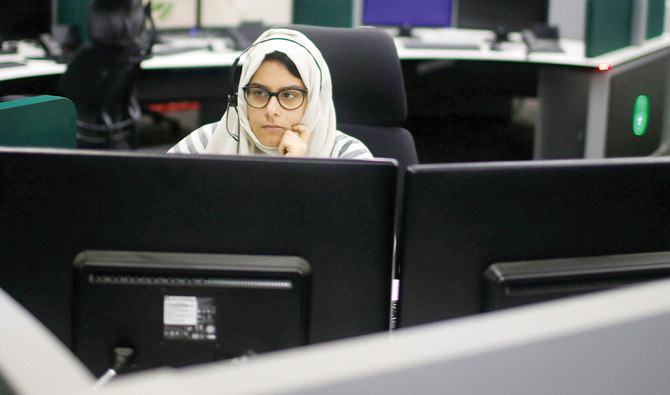RIYADH: Technology has opened a window for job opportunities that overcome the obstacles of time and place.
The minister of labor and social development recently launched the second phase of the “remote-work” program that includes an electronic portal for self-employment that will help to achieve the Vision 2030 plan to find suitable job opportunities for Saudi citizens.
The platform brings together job seekers and business owners to offer suitable and stimulating job opportunities that guarantee stability and independence, when the number of Saudis looking for jobs during the third quarter of 2019 was 1,025,328, according to the Ministry of Civil Service and the Human Resources Development Fund.
The ministry explained that the launch of the second phase of the program came after it had set the controls governing all related procedures.
“It’s a very good idea. Not all companies can provide a location suitable for males and females. It will ease the Saudization process by providing job opportunities that are in line with Saudi values, such as for women who are unable to leave their homes for eight hours. The platform will provide a workspace for many who have some challenges that prevent them from going to work,” said Mohammed Al-Suwelah, the founder and CEO of Ajeek.
“Many companies depend on knowledgeable economies and e-commerce to grow their business, which makes them hire online freelancers from around the world,” he said. “Now remote work will open an opportunity for Saudi citizens to work from a distance and enable them to increase their competencies, which I think will encourage us to employ them to do the job instead of hiring an international freelancer. Last but not least, it will increase the income of part-timers.”
He added, “We as businessmen should support the platform by all means.”
The platform is a new approach in Saudi Arabia to bring unemployment down to 7 percent by 2030, in line with the objectives of Vision 2030. According to the General Authority for Statistics labor market bulletin report, the present unemployment rate for the total Saudi population is 12 percent, compared to 12.3 percent for the second quarter of last year.
According to Khaled Al-Harthi, the owner of Bin Dubais Company for Trading and Contracting, and a member of the Makkah Chamber, “the platform will have a positive impact on economic and employment aspects, as it will broaden the hiring opportunities for both sides. (For individuals) it will minimize the transportation traffic load by working from home, and will enable companies to control spending on renting office spaces by narrowing down the number of in-office employees.”
Waleed Al-Ammari, the manager of the fabric department at Salem Hasan Al-Ammari, vice president of the Jeddah Youth Business Committee and a member of the fabric committee at the Jeddah Chamber, said: “The platform is a very good initiative that should have been launched before now. It supports people who face circumstances that prevent them from leaving their homes, and it is also an additional source of income. As for business owners, it will help Saudization, and help to fulfill the services we need with applicants who have the required competencies, but can’t be hired due to some challenging reasons.”
















